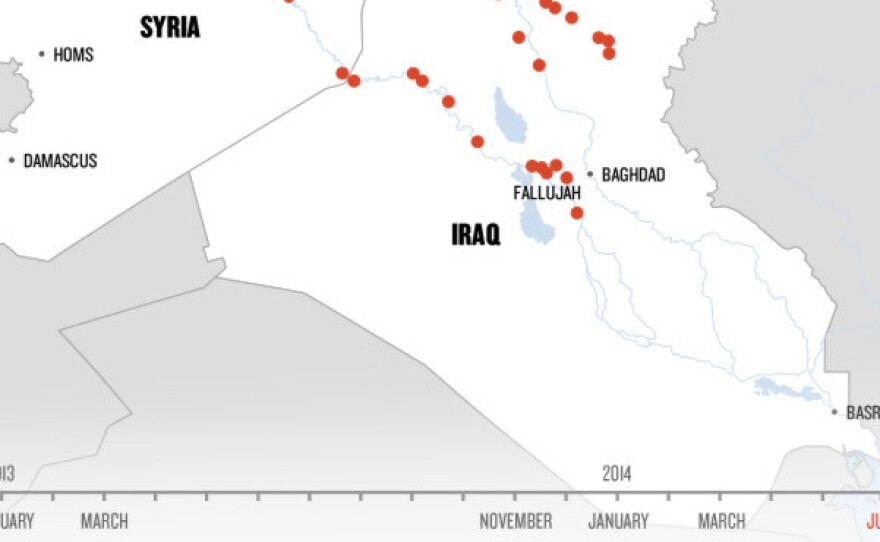As this animated map shows, the extremist Islamist group ISIS, the Islamic State of Iraq and Syria, has made major gains since it was created early last year with the goal of establishing an Islamic empire, or caliphate, across the Middle East with little or no regard to existing borders.
Capitalizing on the turmoil in Syria and Iraq, ISIS fighters have been able to move back and forth with relative ease across the thinly populated deserts of eastern Syria and western Iraq.
ISIS began fighting and capturing towns last year in eastern and then northern Syria, as the initial red dots, from January 2013, show on the map. Its battle with President's Bashar Assad's government has expanded to include frequent clashes with the other rebel groups that are also fighting Assad's regime.
After the conquests in Syria, ISIS began moving aggressively into western Iraq and taking control of multiple towns and notching a major victory in January this year by taking the city of Fallujah, just an hour's drive west of Baghdad.
ISIS scored its biggest triumph to date this week when it overran the northern city of Mosul, one of Iraq's largest cities and home to some 2 million people. Iraqi troops folded without a major fight, and lSIS has followed up by pushing further south and taking more cities on the road to Baghdad.
The group now controls many cities in towns in the Sunni areas west and north of the capital. But it can expect much tougher resistance as it starts to reach Shiite areas closer to the capital.
It's worth noting that that Euphrates and Tigris rivers, which gave rise to the earliest civilizations, also feature prominently in the latest fighting. In this desert region, most towns and cites are built along the rivers.
Last year and early this year, ISIS has captured population centers up and down the Euphrates River, on both sides of the Syria-Iraq border. This week, the group seized Mosul, which straddles the Tigris River, and has been advancing into towns further south along the river.
ISIS, which is led by an Iraqi, Abu Bakar al-Baghdadi, was initially linked to al-Qaida. But the al-Qaida leadership deemed its tactics so extreme that it effectively severed the ties. Since the rupture, ISIS has operated largely on its own, but that has not slowed the group down. Some analysts see ISIS as rivaling al-Qaida as the single most powerful jihadist group.
ISIS has alienated many civilians in the areas where they operate with its extreme interpretation of Islamic law. Yet in just over a year, ISIS has become a powerful force fueling the conflicts in both Syria and Iraq.
Copyright 2014 NPR. To see more, visit http://www.npr.org/







